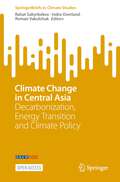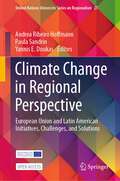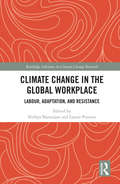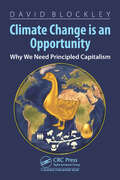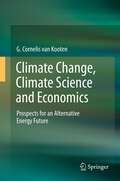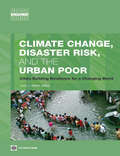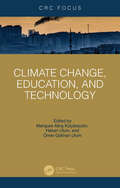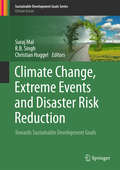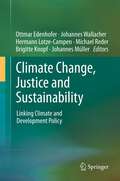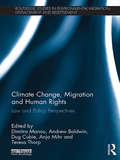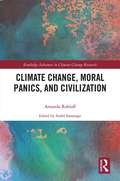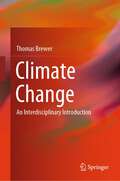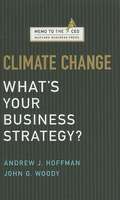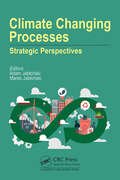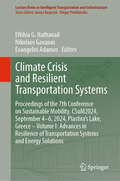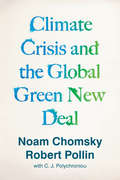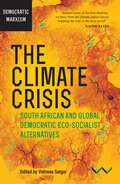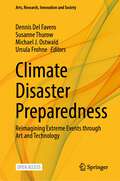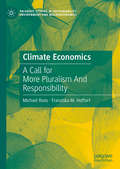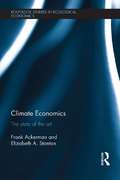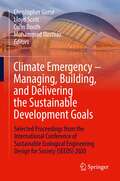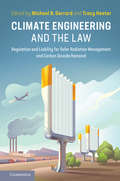- Table View
- List View
Climate Change in Central Asia: Decarbonization, Energy Transition and Climate Policy (SpringerBriefs in Climate Studies)
by Indra Overland Rahat Sabyrbekov Roman VakulchukThis open access book explores climate change impacts, adaptation, and mitigation in Central Asia and discusses policy options for the Central Asian governments. To address the urgent need for local scholarship on climate change in Central Asia, and in particular the need for more research by social scientists, this book features a wide range of contributions on climate change impacts, adaptation and mitigation in the region. Each chapter makes an important contribution to social science scholarship on climate change and decarbonization in Central Asia. Topics include decarbonization opportunities, carbon pricing instruments, the geo-economics of the energy transition, the relationship between human mobility and climate change. The book thus offers valuable insights for both academics and policymakers.
Climate Change in Regional Perspective: European Union and Latin American Initiatives, Challenges, and Solutions (United Nations University Series on Regionalism #27)
by Andrea Ribeiro Hoffmann Paula Sandrin Yannis E. DoukasThis Open Access book addresses climate change in Europe and Latin America from a comparative regionalism studies (CRS) perspective. Written by an international team of scholars and experts, chapters critically analyze proposals for mitigating climate change while contributing to the mutual understanding about the issues at stake across regions. The book is divided into three main sections. In the first section, authors discuss EU and Latin American cooperation, negotiations, and perspectives on climate change, exploring their agendas, the interests and key challenges at the global, regional and interregional levels. The second section focuses on the challenges to finance development and a greener economy. The third section explores new green solutions to climate change in the agriculture sector and initiatives such as nature-based solutions to climate change and best practices. Providing policy oriented solutions for combatting regional climate change at a critical juncture, this volume will be of interest to researchers and students of international relations, international law, and environmental politics, as well as public officials and climate change activists.
Climate Change in the Global Workplace: Labour, Adaptation and Resistance (Routledge Advances in Climate Change Research)
by Nithya Natarajan; Laurie ParsonsThis book offers a timely exploration of how climate change manifests in the global workplace. It draws together accounts of workers, their work, and the politics of resistance in order to enable us to better understand how the impacts of climate change are structured by the economic and social processes of labour. Focusing on nine empirically grounded cases of labour under climate change, this volume links the tools and methods of critical labour studies to key debates over climate change adaptation and mitigation in order to highlight the active nature of struggles in the climate-impacted workplace. Spanning cases including commercial agriculture in Turkey, labour unions in the UK, and brick kilns in Cambodia, this collection offers a novel lens on the changing climate, showing how both the impacts of climate change and adaptations to it emerge through the prism of working lives. Drawing together scholars from anthropology, political economy, geography, and development studies, this book will be of great interest to students and scholars of climate change adaptation, labour studies, and environmental justice. More generally, it will be of interest to anybody seeking to understand how the changing climate is changing the terms, conditions, and politics of the global workplace.
Climate Change is an Opportunity: Why We Need Principled Capitalism
by David BlockleyWe have an imperative, as never before, to change our ways. Climate change is presenting the entire human race with its greatest ever existential challenge. Like many I feel a growing sense of looming disaster. Yes, we are making some progress, but past agreements are not delivering. In this book I put a case for a new form of principled capitalism based on moral principles rather than utility and profit. I propose ten pillars that include systems thinking as citizens of the world and embracing Modern Monetary theory to guide decisions about macroeconomics and national debt.
Climate Change, Capitalism, and Corporations
by Christopher WrightClimate change is one of the greatest threats facing humanity, a definitive manifestation of the well-worn links between progress and devastation. This book explores the complex relationship that the corporate world has with climate change and examines the central role of corporations in shaping political and social responses to the climate crisis. The principal message of the book is that despite the need for dramatic economic and political change, corporate capitalism continues to rely on the maintenance of 'business as usual'. The authors explore the different processes through which corporations engage with climate change. Key discussion points include climate change as business risk, corporate climate politics, the role of justification and compromise, and managerial identity and emotional reactions to climate change. Written for researchers and graduate students, this book moves beyond descriptive and normative approaches to provide a sociologically and critically informed theory of corporate responses to climate change.
Climate Change, Climate Science and Economics: Prospects for an Alternative Energy Future
by G. Cornelis van KootenThis volume enables readers to understand the complexity associated with climate change policy and the science behind it. For example, the author describes the criticism and defense of the widely known "hockey stick" temperature graph derived from combining instrumental data and proxy temperature indications using tree ring, ice core and other paleoclimatic data. Readers will also learn that global warming cannot easily be avoided by reducing CO2 and other greenhouse gas emissions in rich countries. Not only is emissions reduction extremely difficult in rich countries, but demands such as the UN mandate to improve the lives of the poorest global citizens cannot be satisfied without significantly increasing global energy use, and CO2 emissions. Therefore, the author asserts that climate engineering and adaptation are preferable to mitigation, particularly since the science is less than adequate for making firm statements about the Earth's future climate. Readers will also learn that global warming cannot easily be avoided by reducing CO2 and other greenhouse gas emissions in rich countries. Not only is emissions reduction extremely difficult in rich countries, but demands such as the UN mandate to improve the lives of the poorest global citizens cannot be satisfied without significantly increasing global energy use, and CO2 emissions. Therefore, the author asserts that climate engineering and adaptation are preferable to mitigation, particularly since the science is less than adequate for making firm statements about the Earth's future climate.
Climate Change, Disaster Risk, and the Urban Poor
by Judy L. BakerPoor people living in slums are at particularly high risk from the impacts of climate change and natural hazards. They live on the most vulnerable lands within cities, typically areas that are deemed undesirable by others and are thus affordable. Residents are exposed to the impacts of landslides, sea-level rise, flooding, and other hazards. Exposure to risk is exacerbated by overcrowded living conditions, lack of adequate infrastructure and services, unsafe housing, inadequate nutrition, and poor health. These conditions can turn a natural hazard or change in climate into a disaster, and result in the loss of basic services, damage or destruction to homes, loss of livelihoods, malnutrition, disease, disability, and loss of life. This study analyzes the key challenges facing the urban poor given the risks associated with climate change and disasters, particularly with regard to the delivery of basic services, and identifies strategies and financing opportunities for addressing these risks. Several key findings emerge from the study and provide guidance for addressing risk: * The urban poor are on the front line. The poor are particularly vulnerable to climate change and natural hazards due to where they live within cities, and the lack of reliable basic services. * City governments are the drivers for addressing risks. Local governments play a vital role in providing basic services which are critical to improving the resilience of the urban poor. * City officials build resilience by mainstreaming risk reduction into urban management. Climate change adaptation and disaster risk reduction can be best addressed and sustained over time through integration with existing urban planning and management practices. * Significant financial support is needed. Local governments need to leverage existing and new resources to meet the shortfalls in service delivery and basic infrastructure adaptation.
Climate Change, Education, and Technology
by Ömer Gökhan Ulum Hakan Ulum Menşure Alkış KüçükaydınThe climate change crisis is the greatest challenge humanity has ever confronted. As human activities are the most significant cause for this crisis, the solution must come from within humanity. While global movements—NGOs, universities, municipal governments, etc.—are doing their part to combat the crisis, the role of education and technology cannot be emphasized enough. Education is necessary to enhance awareness, especially among the youth, generate solutions, and implement them. Technology contributes to this process by creating climate change-fighting solutions, accumulating and analysing data, and providing energy efficiency. Technology also enables the monitoring of the climate, the mitigation of its effects, and the enhancement of the environment. Therefore, climate change, education, and the use of technology should be addressed as a unit. In this volume, the authors integrate climate change, education, and technological applications.This book is comprehensive and offers readers a variety of perspectives, encouraging the generation of novel and inventive ideas. The collaboration of authors from various disciplines to address the issue brings about novel and intriguing perspectives.
Climate Change, Extreme Events and Disaster Risk Reduction: Towards Sustainable Development Goals (Sustainable Development Goals Series)
by Christian Huggel R. B. Singh Suraj MalThis book discusses the science, causes, impacts and risk reduction strategies for climate change and disasters. It focuses on the use of traditional knowledge, new innovation and education to build a culture of safety and resilience at all levels in order to promote sustainable development goals in general and disaster risk reduction in particular. The global climate has changed substantially over the last century. There is strong evidence of global climate change in the form of increase in air and sea surface temperature, recession of glaciers, changes and shifting of climate regimes, increasing number of extreme events and sea levels changes. The increasing frequency of climate change induced disasters in particular is posing a threat to resilience, lives and livelihoods at global, regional and local levels. Major ecosystems of the world have experienced several climate induced disaster events in recent past. This book provides new insights into the occ urrence and impacts of climatic extremes and strategies for disaster risk reduction. It includes studies on rainfall and temperature trends, floods and drought disasters, weather and climatic related disasters in mountains, changes in plant activities, risk assessment and responses in different ecosystems of the world. The book is particularly useful for environmental and disaster managers, researchers and graduate students, as well as policy makers.
Climate Change, Justice and Sustainability: Linking Climate and Development Policy
by Johannes Müller Hermann Lotze-Campen Johannes Wallacher Michael Reder Brigitte Knopf Ottmar EdenhoferAnalysing and synthesising vast data sets from a multitude of disciplines including climate science, economics, hydrology and agricultural research, this volume seeks new methods of combining climate change mitigation, adaptation, development, and poverty reduction in ways that are effective, efficient and equitable. A guiding principle of the project is that new alliances of state and non-state sector partners are urgently required to establish cooperative responses to the threats posed by climate change. This volume offers a vital policy framework for linking our response to this change with progressive principles of global justice and sustainable development.
Climate Change, Livelihood Diversification and Well-Being: The Case of Rural Odisha (SpringerBriefs in Economics)
by Arup Mitra Saudamini Das Amarnath Tripathi Tapas Kumar Sarangi Thiagu RanganathanThis book assesses the capacity of the rural populace in terms of their ability to perceive a change in climatic variables and, if so, how they react to these changes in order to minimize the adverse effect of climate change. It evaluates the role of education and exposure to change in physiological variables like temperature, precipitation, etc., in forming the right perception of climate change. While analysing livelihood diversification as a strategy to cope with climate change concerns across geography (districts), caste, education and the primary occupation of the households, the book also considers factors affecting diversification. One important aspect of well-being is consumption; thus, by focusing on consumption changes over time and relating it to livelihood diversification, the book makes an in-depth analysis of the coping mechanisms. Diversification adopted in the face of compulsion and in a situation of stagnancy may result in a range of low productivity activities, whereas diversification as an attempt to explore newer pathways in a vibrant context to reduce income risks and smooth consumption can be highly beneficial. The book, thus, focuses on job profile and occupational diversification of the sample households, the extent of instability in occupations and the distribution of households in terms of consumption pattern, the inter-temporal changes in it and the determinants. The book is useful for researchers, students in environmental studies, policy-makers, NGOs and also the common reader who wants to understand climate change, its effects on livelihoods and ways to overcome the shocks. It reflects on effective policies which can create awareness and empower people to explore opportunities for livelihood creation so that the overall is sustained if not improved.
Climate Change, Migration and Human Rights: Law and Policy Perspectives (Routledge Studies in Environmental Migration, Displacement and Resettlement)
by Anja Mihr Dug Cubie Dimitra Manou Andrew Baldwin Teresa ThorpClimate Change already having serious impacts on the lives of millions of people across the world. These impacts are not only ecological, but also social, economic and legal. Among the most significant of such impacts is climate change-induced migration. The implications of this on human rights raise pressing questions, which require serious scholarly reflection. Drawing together experts in this field, Climate Change, Migration and Human Rights offers a fresh perspective on human rights law and policy issues in the climate change regime by examining the interrelationships between various aspects of human rights, climate change and migration. Three key themes are explored: understanding the concepts of human dignity, human rights and human security; the theoretical nexus between human rights, climate change and migration or displacement; and the practical implications and challenges for lawyers and policy-makers of protecting human dignity in the face of climate change and displacement. The book also includes a series of case studies from Alaska, Bangladesh, Kenya and the Pacific islands which aim to improve our understanding of the theoretical and practical implications of climate change for human rights and migration. This book will be of great interest to scholars of environmental law and policy, human rights law, climate change, and migration and refugee studies.
Climate Change, Moral Panics and Civilization (Routledge Advances in Climate Change Research)
by Amanda RohloffIn recent years, interest in climate change has rapidly increased in the social sciences and yet there is still relatively little published material in the field that seeks to understand the development of climate change as a perceived social problem. This book contributes to filling this gap by theoretically linking the study of the historical development of social perceptions about ‘nature’ and climate change with the figurational sociology of Norbert Elias and the study of moral panics. By focusing sociological theory on climate change, this book situates the issue within the broader context of the development of ecological civilizing processes and comes to conceive of contemporary campaigns surrounding climate change as instances of moral panics/civilizing offensives with both civilizing and decivilizing effects. In the process, the author not only proposes a new approach to moral panics research, but makes a fundamental contribution to the development of figuration sociology and the understanding of how climate change has developed as a social problem, with significant implications regarding how to improve the efficacy of climate change campaigns. This highly innovative study should be of interest to students and researchers working in the fields of sociology, environment and sustainability, media studies and political science.
Climate Change: An Interdisciplinary Introduction
by Thomas BrewerThis textbook introduces and explains the issues around climate change and its mitigation. It includes topics across disciplines and can be used as a single-volume text by students studying a range of subjects. Among the topics included are: ·How to adopt significant mitigation measures now to avoid the most catastrophic long-term consequences of climate change.·Reducing the rates of highly potent, short-lived emissions of methane gas and black carbon particulates—reductions that are necessary to meet the temperature targets of the Paris Agreements.·Implementing wide-ranging adaptation measures to reduce the deaths and economic costs of extreme heat waves, droughts, wildfires, hurricanes, and floods.·Recognizing the unusually rapid warming in the Arctic, which is disrupting weather patterns in the northern hemisphere and currents in the Atlantic Ocean, causing world-wide sea-level rise, and also causing methane leaks in the Arctic region—leaks that could eventually lead to irreversible global warming consequences. Meeting these challenges effectively requires action by both governments and businesses. The book examines the national and local governmental policies—and business practices—that are needed in sector-specific chapters. An objective of the book is to inform readers about specific problems resulting from climate change—and the wide range of potential government policies and business practices, changes in technologies, and changes in public attitudes and actions that can reduce the emissions and otherwise lessen their impacts. Indeed, a central message is that understanding the issues posed by climate change requires no less than an understanding of climate science, micro- and macro-economics, technologies for mitigation and adaptation measures, as well as politics and law at many governmental levels from local to global. The author has included short case studies that illustrate and integrate multiple analytic perspectives. The book is therefore appropriate for students, professionals, and general audiences with wide-ranging interests and backgrounds.
Climate Change: An Unfolding Story
by Joseph B. Lassiter Sid Misra Stephanie PuzioIn some parts of the world, the impacts of climate change will prove to be relatively manageable, particularly for the rich. In some parts of the world, these will not, particularly for the poor. The only certainty is that humanity's collective actions will force every individual to answer that classic question, "Are you feeling lucky?"
Climate Change: What's Your Business Strategy?
by Andrew J. Hoffman John G. WoodyBelieve or not, climate change is one of the most pressing challenges facing the world today. Most of all, it is quickly becoming a crucial business issue. But how will you and your company respond? You need fast and reliable advice from the world's foremost experts. Climate Change delivers just that: four strategies from two MBA professors with broad and deep experience with environmental issues. Climate Change gives you a first-hand look at how world-class thinkers would react to this pressing issue if they were in your shoes. From our new Memo to the CEO series - solutions-focused advice from today's leading practitioners.
Climate Changing Processes: Strategic Perspectives
by Adam Jabłoński Marek JabłońskiThe aim of the monograph is to present a modern and innovative approach to the issues of dysfunctions of economic and social ecosystems caused by climate anomalies. The deformation of the economic and social system caused by climate change has a surprising dimension and the degree of impact of climate change on the organizational behavior of various types of entities determines in many cases their ability to survive. Survival does not apply to all organizations, but only to those that are able to make appropriate, effective and efficient decisions in an environment of many crises. They should result from the logic, methodology of the conceptual framework adequate for the management mechanisms of a given type of organization, taking into account sectoral conditions.
Climate Crisis and Resilient Transportation Systems: Proceedings of the 7th Conference on Sustainable Mobility, CSuM2024, September 4–6, 2024, Plastira’s Lake, Greece – Volume I: Advances in Resilience of Transportation Systems and Energy Solutions (Lecture Notes in Intelligent Transportation and Infrastructure)
by Eftihia G. Nathanail Nikolaos Gavanas Evangelos AdamosThis book reports on original research and practical findings fostering resilient and sustainable transportation systems in response to the climate crisis. Being the first volume of the proceedings of the 7th Conference on Sustainable Mobility (CSuM 2024), held on September 4–6, 2024, at Plastira’s Lake, Greece, it focuses on research and practical strategies for developing sustainable and resilient transportation systems, and guidance for their green and digital transition. All in all, this book offers extensive information to academicians, researchers, practitioners and decision makers working on effective strategies to enhance resilence of transportation systems.
Climate Crisis and the Global Green New Deal: The Political Economy of Saving the Planet
by Noam Chomsky Robert PollinClimate change: watershed or endgame? In this compelling new book, Noam Chomsky, the world&’s leading public intellectual, and Robert Pollin, a renowned progressive economist, map out the catastrophic consequences of unchecked climate change—and present a realistic blueprint for change: the Green New Deal. Together, Chomsky and Pollin show how the forecasts for a hotter planet strain the imagination: vast stretches of the Earth will become uninhabitable, plagued by extreme weather, drought, rising seas, and crop failure. Arguing against the misplaced fear of economic disaster and unemployment arising from the transition to a green economy, they show how this bogus concern encourages climate denialism. Humanity must stop burning fossil fuels within the next thirty years and do so in a way that improves living standards and opportunities for working people. This is the goal of the Green New Deal and, as the authors make clear, it is entirely feasible. Climate change is an emergency that cannot be ignored. This book shows how it can be overcome both politically and economically.
Climate Crisis, The: South African and Global Democratic Eco-Socialist Alternatives
by Vishwas SatgarEssays that address the question: how can people and class agency change this destructive course of history?Capitalism’s addiction to fossil fuels is heating our planet at a pace and scale never before experienced. Extreme weather patterns, rising sea levels and accelerating feedback loops are a commonplace feature of our lives. The number of environmental refugees is increasing and several island states and low-lying countries are becoming vulnerable. Corporate-induced climate change has set us on an ecocidal path of species extinction. Governments and their international platforms such as the Paris Climate Agreement deliver too little, too late. Most states, including South Africa, continue on their carbon-intensive energy paths, with devastating results. Political leaders across the world are failing to provide systemic solutions to the climate crisis. This is the context in which we must ask ourselves: how can people and class agency change this destructive course of history? Volume three in the Democratic Marxism series, The Climate Crisis investigates eco-socialist alternatives that are emerging. It presents the thinking of leading climate justice activists, campaigners and social movements advancing systemic alternatives and developing bottom-up, just transitions to sustain life. Through a combination of theoretical and empirical work, the authors collectively examine the challenges and opportunities inherent in the current moment. This volume builds on the class-struggle focus of Volume 2 by placing ecological issues at the centre of democratic Marxism. Most importantly, it explores ways to renew historical socialism with democratic, eco-socialist alternatives to meet current challenges in South Africa and the world.
Climate Disaster Preparedness: Reimagining Extreme Events through Art and Technology (Arts, Research, Innovation and Society)
by Michael J. Ostwald Ursula Frohne Dennis Del Favero Susanne ThurowAs a result of global warming, extreme events, such as firestorms and flash floods, pose increasingly unpredictable and uncertain existential threats, taking lives, destroying communities, and wreaking havoc on habitats. Current aesthetic, technological and scientific frameworks struggle to imagine, visualise and rehearse human interactions with these events, hampering the development of proactive foresight, readiness and response.This open access book demonstrates how the latest advances in creative arts, intelligent systems and climate science can be integrated and leveraged to transform the visualisation of extreme event scenarios. It reframes current practice from passive perception of pre-scripted illustrations to active immersion in evolving life-like interactive scenarios that are geo-located. Drawing on the multidisciplinary expertise of leaders in the creative arts, climate sciences, environmental engineering, and intelligent systems, this book examines the waysin which climate disaster preparedness can be reformulated through practices that address dynamic and unforeseen interactions between climate and human life worlds. Grouped into four sections (picturing, narrating, rehearsing, and communicating), this book maps this approach by exploring the emerging strengths and current limitations of each discipline in addressing the challenge of envisioning the unpredictable interaction of extreme events with human populations and environments. This book provides a timely intervention into the global discourse on how art, culture and technology can address climate disaster resilience. It appeals to readers from multiple fields, offering academic, industry and community audiences novel insights into a profound gap in the current knowledge, policy and action landscape.
Climate Economics: A Call for More Pluralism And Responsibility (Palgrave Studies in Sustainability, Environment and Macroeconomics)
by Michael Roos Franziska M. HoffartThis book is a philosophical critique of the economics of climate change from both an ethical and philosophy of economics perspective. Mitigating climate change is not so much a scientific problem, but rather a political, social and above all an economic problem. A future without greenhouse gas emissions requires a radical transformation towards a sustainable low-carbon economy and society. How this transformation could be achieved raises numerous economic questions. Many of these questions remain untouched, although economists are equipped with a suitable toolkit and expertise. This book argues that economists have a social responsibility to carry out more research on how global warming could be stopped and that, ultimately, economic analysis of climate change must be a political economic approach that treats the economy as part of a wider social system. This approach will be of interest to policy makers, educators, students and researchers in support of more pluralism in economic research and teaching.
Climate Economics: The State of the Art (Routledge Studies in Ecological Economics)
by Frank Ackerman Elizabeth A. StantonClimate science paints a bleak picture: The continued growth of greenhouse gas emissions is increasingly likely to cause irreversible and catastrophic effects. Urgent action is needed to prepare for the initial rounds of climatic change, which are already unstoppable. While the opportunity to avert all climate damage has now passed, well-designed mitigation and adaptation policies, if adopted quickly, could still greatly reduce the likelihood of the most tragic and far-reaching impacts of climate change. Climate economics is the bridge between science and policy, translating scientific predictions about physical systems into projections about economic growth and human welfare that decision makers can most readily use but it has too often consisted of an overly technical, academic approach to the problem. Getting climate economics right is not about publishing the cleverest article of the year but rather about helping solve the dilemma of the century. The tasks ahead are daunting, and failure, unfortunately, is quite possible. Better approaches to climate economics will allow economists to be part of the solution rather than part of the problem. This book analyzes potential paths for improvement.
Climate Emergency – Managing, Building , and Delivering the Sustainable Development Goals: Selected Proceedings from the International Conference of Sustainable Ecological Engineering Design for Society (SEEDS) 2020
by Mohammad Dastbaz Christopher Gorse Colin Booth Lloyd ScottThrough research and proven practice, the aim of the International Conference of Sustainable Ecological Engineering Design for Society (SEEDS) is to foster ideas on how to reduce negative impacts on the environment while providing for the health and well-being of society. The professions and fields of research required to ensure buildings meet user demands and provide healthy enclosures are many and diverse. The SEEDS conference addresses the interdependence of people, the built and natural environments, and recognizes the interdisciplinary and international themes necessary to assemble the knowledge required for positive change.
Climate Engineering and the Law: Regulation And Liability For Solar Radiation Management And Carbon Dioxide Removal
by Michael B. Gerrard Tracy HesterClimate change is increasingly recognized as a global threat, and is already contributing to record-breaking hurricanes and heat waves. To prevent the worst impacts, attention is now turning to climate engineering - the intentional large-scale modification of the environment to reduce the impact of climate change. The two principal methods involve removing some carbon dioxide from the atmosphere (which could consume huge amounts of land and money, and take a long period of time), and reducing the amount of solar radiation reaching the earth's surface, perhaps by spraying aerosols into the upper atmosphere from airplanes (which could be done quickly but is risky and highly controversial). <P><P>This is the first book to focus on the legal aspects of these technologies: what government approvals would be needed; how liability would be assessed and compensation provided if something goes wrong; and how a governance system could be structured and agreed internationally.<P> In view of the disastrous Hurricanes Harvey, Irene and Maria, and the Trump administration's abandonment of action on climate change, increasing attention is going to climate engineering as a way to avoid the worst impacts of climate change.<P> Gives an overview of the relevant laws with detailed legal analysis Makes recommendations for what a governance system for climate engineering should entail.<P> Written and edited by established environmental law experts.
